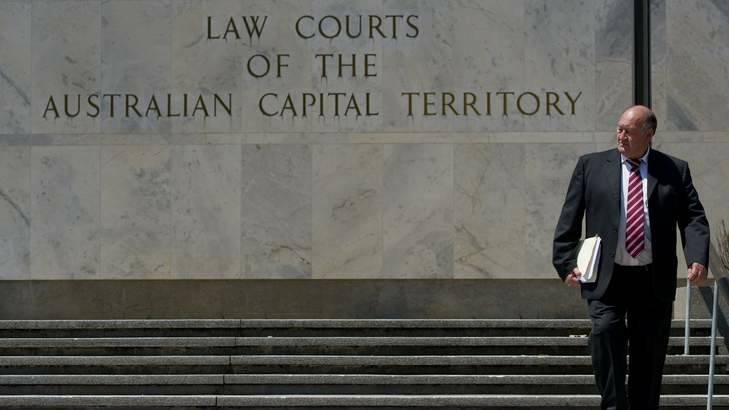The head detective on the Winchester case has denied his team had an ‘‘understanding’’ not to tell prosecutors that their key forensic witness was embroiled in an internal Victorian police investigation.
Subscribe now for unlimited access.
or signup to continue reading
But the inquiry has heard the Australian Federal Police and the Director of Public Prosecutions have been unable to unearth a single written document proving detectives warned their counterparts of the investigation targeting the case’s most crucial forensic expert, Robert Barnes.

Mr Barnes’ analysis of gunshot residue was a key link in the circumstantial case against David Harold Eastman for gunning down ACT police chief Colin Stanley Winchester in his neighbour’s driveway in 1989.
Eastman is serving a life sentence for the murder, but has always maintained his innocence.
The inquiry on Tuesday heard from Richard Ninness, the former head of the AFP team charged with solving the Winchester case, code-named Operation Peat.
In 1992 and 1993, still years before the 1995 trial of Eastman, Mr Barnes was the subject of an internal investigation by Victoria Police for allegedly using its resources for unauthorised private forensic work, for which he asked payment.
Mr Barnes was charged with disciplinary offences but they were dropped after he resigned and moved to a different laboratory.
Mr Ninness said he was made aware of the inquiry into Mr Barnes, but said he was under the impression it was for breaches of administrative procedures and would have no impact on his work on the Eastman case. The experienced detective travelled to Victoria to be briefed about the investigation.
Counsel assisting the inquiry, Liesl Chapman, SC, quizzed Mr Ninness about whether he had told the prosecution about the probe.
One of the inquiry’s aims is to establish whether the prosecution neglected its duty to tell Eastman’s defence team anything that could cast doubt on the veracity and reliability of Mr Barnes, whose gunshot residue evidence linked the former public servant to the murder scene.
Commander Ninness said prosecutors were informed and that he thought he had briefed them. He also said he had no clear recollection of personally telling them.
Subpoenas served on the Australian Federal Police and the Director of Public Prosecutions have failed to uncover any written record of communication between the two about the investigation into Mr Barnes.
That is despite records of meetings clearly showing that police and prosecutors discussed related issues, such as the fact that Mr Barnes had resigned.
Ms Chapman asked Mr Ninness whether there was any understanding with his team or with another Operation Peat detective, Detective Sergeant Tom McQuillen, not to tell the prosecution of the concerns surrounding their chief forensic witness.
‘‘Certainly not. I can see no reason why they wouldn’t have been informed,’’ Mr Ninness said.
Mr Ninness was also questioned over a covert telephone recording of Mr Barnes, in which the independent forensic expert describes himself as a ‘‘police witness’’.
That recording also reveals that Mr Barnes spoke of wanting to ‘‘put the brakes’’ on other experts criticising his work, particularly in writing.
Mr Ninness said he was not aware that his colleague, Detective Sergeant McQuillen, had recorded the phone call with Mr Barnes, and said it was ‘‘highly unusual’’.
He said Mr Barnes’ comments were ‘‘out of line’’ and that, if he had known, he would have been concerned and passed the information on to the prosecution.
When asked why he would be concerned about Mr Barnes’ comments by the inquiry head, Acting Justice Brian Martin, Mr Ninness said ‘‘He may have been overstepping the mark.’’
‘‘May have been?’’ Acting Justice Martin asked.
‘‘He was overstepping the mark,’’ Mr Ninness said.
Mr Ninness’ evidence will continue on Wednesday.

